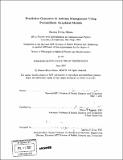Predictive genomics in asthma management using probabilistic graphical models
Author(s)
Himes, Blanca Elena
DownloadFull printable version (17.49Mb)
Other Contributors
Harvard University--MIT Division of Health Sciences and Technology.
Advisor
Marco F. Ramoni.
Terms of use
Metadata
Show full item recordAbstract
Complex traits are conditions that, as a result of the complex interplay among genetic and environmental factors, have wide variability in progression and manifestation. Because most common diseases with high morbidity and mortality are complex traits, uncovering the genetic architecture of these traits is an important health problem. Asthma, a chronic inflammatory airway disease, is one such trait that affects over 300 million people around the world. Although there is a large amount of human genetic information currently available and expanding at a rapid pace, traditional genetic studies have not provided a concomitant understanding of complex traits, including asthma and its related phenotypes. Despite the intricate genetic background underlying complex traits, most traditional genetic studies focus on individual genetic variants. New methods that consider multiple genetic variants are needed in order to accelerate the understanding of complex traits. In this thesis, the need for better analytic approaches for the study of complex traits is addressed with the creation of a novel method. Probabilistic graphical models (PGMs) are a powerful technique that can overcome limitations of conventional association study approaches. (cont.) Going beyond single or pairwise gene interactions with a phenotype, PGMs are able to account for complex gene interactions and make predictions of a phenotype. Most PGMs have limited scalability with large genetic datasets. Here, a procedure called phenocentric Bayesian networks that is tailored for the discovery of complex multivariate models for a trait using large genomic datasets is presented. Resulting models can be used to predict outcomes of a phenotype, which allows for meaningful validation and potential applicability in a clinical setting. The utility of phenocentric Bayesian networks is demonstrated with the creation of predictive models for two complex traits related to asthma management: exacerbation and bronchodilator response. The good predictive accuracy of each model is established and shown to be superior to single gene analysis. The results of this work demonstrate the promise of using the phenocentric Bayesian networks to study the genetic architecture of complex traits, and the utility of multigenic predictive methods compared to traditional single-gene approaches.
Description
Thesis (Ph. D.)--Harvard-MIT Division of Health Sciences and Technology, 2007. Includes bibliographical references (leaves 126-142).
Date issued
2007Department
Harvard University--MIT Division of Health Sciences and TechnologyPublisher
Massachusetts Institute of Technology
Keywords
Harvard University--MIT Division of Health Sciences and Technology.